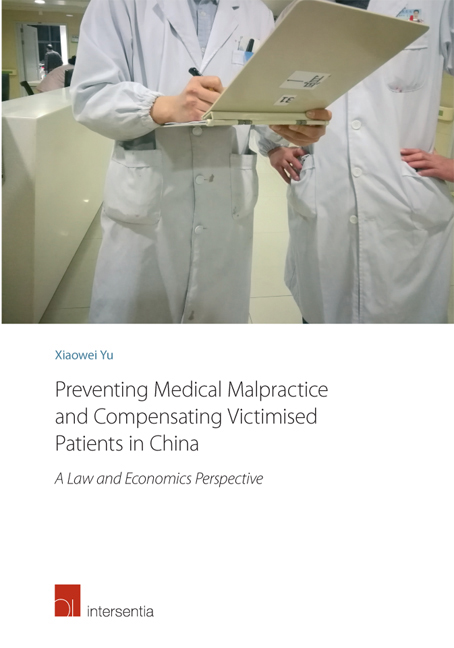 Preventing Medical Malpractice and Compensating Victimised Patients in China
Preventing Medical Malpractice and Compensating Victimised Patients in China Book contents
- Frontmatter
- Acknowledgements
- Contents
- Abbreviations
- List of Figures and Tables
- Chapter 1 Introduction
- Part I Legal Remedies for Medical Malpractice in China
- Part II Economic Theories and Empirical Evidence
- Introductory Note
- Chapter 7 Preventing Medical Errors through Tort Law – Theoretical Models
- Chapter 8 Preventing Medical Errors through Tort Law – Empirical Evidence and Updated Models
- Chapter 9 Preventing Medical Errors through Alternative Regimes
- Chapter 10 The Fault-Based Compensation Mechanisms for Iatrogenic Injuries
- Chapter 11 Medical Compensation Mechanisms Not Based on Fault
- Part III Applying the Economic Observations to China
- Summary
- Bibliography
- Appendix 1 Legislation
- Appendix 2 Cases
- Appendix 3 Semi-Structured Interviews
- Valorisation Addendum
- Curriculum Vitae
Chapter 11 - Medical Compensation Mechanisms Not Based on Fault
from Part II - Economic Theories and Empirical Evidence
Published online by Cambridge University Press: 29 September 2018
- Frontmatter
- Acknowledgements
- Contents
- Abbreviations
- List of Figures and Tables
- Chapter 1 Introduction
- Part I Legal Remedies for Medical Malpractice in China
- Part II Economic Theories and Empirical Evidence
- Introductory Note
- Chapter 7 Preventing Medical Errors through Tort Law – Theoretical Models
- Chapter 8 Preventing Medical Errors through Tort Law – Empirical Evidence and Updated Models
- Chapter 9 Preventing Medical Errors through Alternative Regimes
- Chapter 10 The Fault-Based Compensation Mechanisms for Iatrogenic Injuries
- Chapter 11 Medical Compensation Mechanisms Not Based on Fault
- Part III Applying the Economic Observations to China
- Summary
- Bibliography
- Appendix 1 Legislation
- Appendix 2 Cases
- Appendix 3 Semi-Structured Interviews
- Valorisation Addendum
- Curriculum Vitae
Summary
INTRODUCTION
It has previously been demonstrated that the fault rule can be justified as a relatively efficient mechanism in that the deterrence benefits that it generates are likely to exceed the tertiary costs that it incurs. As far as compensation is concerned, however, the fault-based malpractice liability alone is inefficient because it cannot guarantee swift and sufficient compensation whenever a patient suffers an iatrogenic injury. Many eligible victimised patients do not sue and many patients who did file a claim may still face tremendous difficulties in establishing fault and causation and may not obtain compensation until several years later.
There are also deficiencies in compensation mechanisms relying on the tort regime such as self-insurance and liability insurance, not only because of the deficiencies of the traditional malpractice liability but also because they have problems of their own. While self-insurance does not work well in the case of insolvency risks, liability insurance suffers from problems such as moral hazard, adverse selection, and severe underwriting cycles. Hence, one may wonder whether there is any alternative mechanism that can achieve the three goals of accident law simultaneously: (1) optimal deterrence (primary cost avoidance), (2) optimal compensation (secondary cost avoidance), and (3) being administratively cost-effective (tertiary cost avoidance).
For this reason, many scholars proposed and several legal systems have already developed the so-called “no-fault” compensation system (or scheme) (hereinafter NFCS) as an alternative to the traditional fault-based malpractice liability regime. Broadly speaking, NFCSs denote insurance programs that “provide compensation on proof of loss without any need to identify another party that caused the loss or prove their fault.” Two common features are characteristic of these no-fault schemes: first, victimised patients normally do not have to prove providers’ fault to obtain compensation; and second, costly malpractice lawsuits can usually be avoided. In a broad sense, no-fault schemes include first-party patient insurance, a special compensation fund covering iatrogenic injuries or social security that provides benefits for patients and the disabled in general. In practice, however, an NFCS specifically refers to a compensation fund that provides cover for personal injuries or iatrogenic injuries.
The NFCS should be distinguished from strict liability. Strict liability is usually described as “liability without fault,” meaning that the defendant will be held liable for any damage that he/she has caused irrespective of whether he/she was at fault or not.
- Type
- Chapter
- Information
- Preventing Medical Malpractice and Compensating Victimised Patients in ChinaA Law and Economics Perspective, pp. 399 - 444Publisher: IntersentiaPrint publication year: 2017


